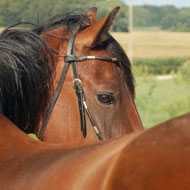
All movements around horse sanctuary return to normal
The final restriction zones at Redwing's Horse Sanctuary have been lifted, following an outbreak of strangles earlier this year.
All movements between Redwing's five sites were temporally suspended after a routine check at Piggots Farm, Norfolk, in February revealed that one of the resident horses had contracted the disease.
At the peak of the outbreak, a total of 24 horses tested positive for strangles, many more required testing and nine quarantine zones were in operation, resulting in a cost of over £4,000 a week on testing, feed and equipment.
As a precautionary measure, the sanctuary also ceased rehoming operations and temporarily closed their Ada Cole visitor centre in Essex due to suspected contact with a strangles case. The action had a notable impact on visitor donations, which the charity so heavily relies on.
In a statement, Redwings Horse Sanctuary said: "Our teams have worked tirelessly to restrict the spread of the disease, but the outbreak has proved a very difficult and challenging time. As a result of restricted horse movements, paddocks could not be rotated and subsequently unable to recover from grazing, requiring a number of our hay stocks reserved for winter to be used prematurely.
"The restriction of movements also applied to staff meaning maintenance work to repair fencing on certain sites was halted – costly improvements which are now desperately needed.
"We have also invested in gallons of disinfectant; every time a quarantine zone was lifted miles of fencing and numerous water tanks, gates and field shelters required cleaning by hand. The total costs have yet to be calculated but it is clear its after-effects will be felt for some time to come."
Reflecting on the crisis, Redwings chief executive Lynn Cutress described the outbreak as one of the biggest challenges the Sanctuary has faced in its 30 year history:
“I’d like to thank our supporters (new and longstanding) for their support and understanding during this extraordinary time” she added.
“I’d also like to thank our amazing staff who have worked so hard to contain the disease; their care for and dedication to the horses has been unceasing – I am so proud of each and every one of them.”



 The latest
The latest